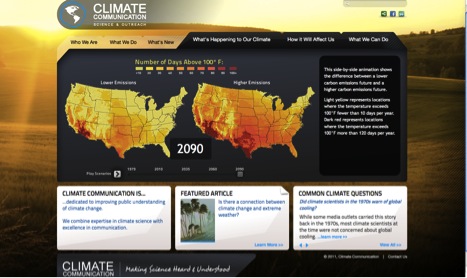Climate Communication: Making Science Heard and Understood
Posted on 13 September 2011 by Susan Joy Hassol
Guest post by Susan Hassol, Director of Climate Communication
John Cook asked me to write a guest post introducing you to Climate Communication, a new science and outreach organization dedicated to improving public understanding of climate change science. Before I do that, I want to say how much I appreciate Skeptical Science’s encyclopedic refutation of every common skeptic claim. It’s a great service to the community and it’s the site I always send people to when they ask how to respond to the typical contrarian talking points. Climate Communication also hopes to contribute something important to the public discussion of climate change.
This is a critical time. The science has never been more clear and compelling. Yet the public has never been so confused and misled. There is much to tell, and there are many scientists who are talented at and committed to telling it. People need to know the facts, and there are labs and universities ready to offer them. People also need to hear the stories of climate change, from scientists and other messengers whom they trust. The need is urgent, as the time for effective action is short. In this context, Climate Communication was born.
I’d spent a couple of decades working with climate scientists to communicate their work to the wider public. I had helped to put a lot of great reports on the shelf (see for example: Global Climate Change Impacts in the United States, Impacts of A Warming Arctic, etc.). But if a tree falls in the forest and not enough people hear, then what?
So we’re here to do everything we can to bring the science forward in a way that it can be heard. We're still doing much of what I’ve been doing for a long time: helping scientists produce accessible reports and other science-based materials. But we're also doing a lot more.
For scientists, we’re offering workshops in communicating climate science that go far beyond typical media training. We focus on the specific challenges of communicating about climate change. We go beyond problems of language to consider psychological and cultural issues. Our Science Director, Richard Somerville, and I led a climate communication workshop at the American Geophysical Union meeting in December 2010 and we’ll both be speaking there again this year. We led a workshop at NASA Jet Propulsion Lab on communicating about climate change. And we have more workshops planned. We welcome inquires about holding additional workshops and professional development sessions.
For journalists, we’re making the latest science available in a more accessible form and helping them identify the best experts to interview on particular topics. In a fast-paced and challenging media environment, we’re bringing the science to journalists in ways that are credible and helpful. Last week we held a telephone press conference featuring leading climate scientists discussing the linkages between extreme weather and climate change. We also posted a summary of the latest peer-reviewed science on that subject. Journalists are welcome to contact us and we’ll do our best to help.
For the public, we’re producing clear, brief summaries of the most important things they need to know about climate change, using not only words but also videos and animations. We’re providing concise answers to the key questions people ask: What’s happening to climate and why? How will it affect us? And what can we do about it?
The Yale and George Mason Universities’ studies tell us the questions most Americans want answered. Our science advisors answer those questions and more, simply and clearly, at our website in both text and videos.
Our Science Advisors include many of the world’s leading climate scientists, who are also great communicators: Ken Caldeira, Julia Cole, Robert Corell, Kerry Emanuel, Katharine Hayhoe, Greg Holland, Jeff Kiehl, Michael MacCracken, Michael Mann, Jeff Masters, Jerry Meehl, Jonathan Overpeck, Camille Parmesan, Barrett Rock, Benjamin Santer, Kevin Trenberth, Warren Washington, and Don Wuebbles.
You can read their bios, learn what they do outside of science, and even see them in action on our website, in brief bio videos. We also put together a short video on what the public really needs to know about climate change. And there are many more videos on common climate questions, extreme weather and climate change, and other topics. We hope to help amplify their voices and bring more clarity to public discussions of this great challenge.
So explore our site, spread the word, and please let us know how we’re doing and what we can do to help you.































 Arguments
Arguments































[DB] Hot-linked URL.